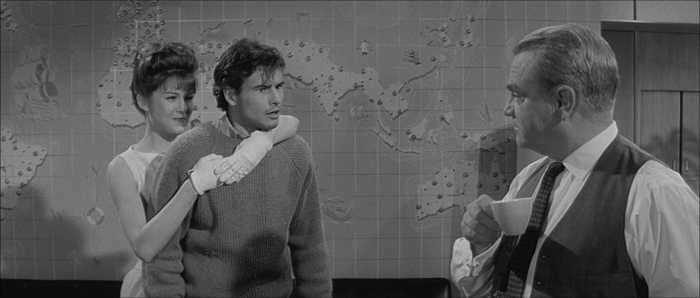
Dir.: Billy Wilder; Cast: James Cagney, Pamela Tiffin, Arlene Francis, Lilo Pulver, Horst Buchholz, Howard St. John; USA 1961, 108 min.
When Wilder adapted Ferenc Molnar’s stage play from 1929 with his regular writing partner I.A.L. Diamond, he wasn’t to know that real life would interfere dramatically with his film set in the divided German capital. But on the day after filming a scene at the Brandenburg Gate in August 1961, when Wilder was putting his feet up at the Kempinski on the Kurfurstendamm, the Wall went up. And Wilder and his team had to scramble over to Munich, where the Brandenburg Gate was re-erected in a studio for a cool $200 000. No wonder, the feature bombed at the box-office: nobody could see the fun any more.
Cagney is CR McNamara, boss of Coca-Cola in West Berlin, but angling for a return to the HQ in Atlanta. Top dog Hazeltine (St. John) entrusts him with his 18 year-old daughter Scarlett (Tiffin), who comes to stay with McNamara and his wife Phyllis (Francis) in their West Berlin home. After Scarlett asks Phyllis “if she had ever made love to a communist”, Phyllis answers in the negative, but adds “I once necked a Stevenson Democrat”. So Scarlett goes on to make sure she’s succeeds, falling in love with communist agitator Otto (Buchholz). CR is successful in having the relationship terminated, “torturing” Otto with American hit songs. But it then turns out Scarlett is pregnant, and CR’s new task is to re-model Otto into a good capitalist, before the Hazeltine parents arrive.
The change from a comedy to a tragedy killed the film off. At its premiere in West Berlin it was slaughtered in the press, the chief critic of the “Berliner Zeitung” writing “our hearts are crying out, but Wilder only sees the funny side”. But when the feature was re-released in 1985, it went on to play for a whole year in West-Berlin’s cinemas.
This was supposed to be Cagney’s last film (he returned with Ragtime in 1981), and his staccato voice delivered the gags memorably. DoP Daniel L. Fapp (West Side Story) films the divided city impressively in black-and-white and Andre Previn’s score underlines the fricative heel-clicking of the Germans, who see in CR just another “Leader”. It may not be Wilder’s finest hour, but it’s very much worth a look in. AS
ON RELEASE FROM 15 APRIL 2019 courtesy of EUREKA